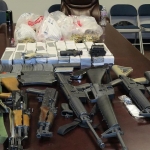IRAQ: Audit of KBR Iraq Contract Faults Records For Fuel, Food; U.S. Says It Will Increase Monitoring in Baghdad
KBR, the government contracting firm formerly under Halliburton, did not keep accurate records of gasoline distribution, put its employees in living spaces that may be larger than warranted and served meals that appeared to cost $4.5 million more than necessary under a contract to perform work in Iraq, according to an audit by a government oversight agency.
The report, to be released today by the special inspector general for Iraq reconstruction, addresses a sliver of a $22.5 billion contract that KBR won to provide services for the U.S. military. The inspector general's office focused on four services that KBR was paid to provide in Baghdad's heavily fortified Green Zone: supplying gasoline, food services, and housing and various morale and recreation services.
The inspector general faulted the U.S. government for not closely monitoring KBR. As a result, the report said, "KBR's operations may have resulted in excessive government costs and high risk that government resources could have been used improperly."
Both the State Department and the Defense Contract Management Agency, two oversight bodies, disputed the notion that oversight was inadequate.
The inspector general said that despite both improper procedures and record-keeping, KBR provided adequate fuel, food and housing. A KBR spokeswoman said in an e-mail that the company had not seen the audit and that "it would be inappropriate for us to comment at this time."
The inspector general and other audit agencies have pointed out previous shortcomings of KBR and the government in overseeing the logistics contract. In November 2004, KBR didn't provide details of the costs it spent on a contract. In October, the inspector general's office criticized KBR for labeling costs, labor rates and internal processes as proprietary information when it was needed to ensure competition and oversight.
As part of its contract, KBR provides gas for vehicles and generators in the Green Zone. In today's report, auditors wrote, "we found weaknesses in KBR's fuel receiving, distributing and accountability processes of such magnitude that we were unable to determine an accurate measurement of the fuel services provided."
KBR didn't use "totalizers," an internal meter in gas pumps that tracks how much fuel is used, according to the report. The contractor used "homemade gauge sticks" to figure out how much fuel was in storage tanks and kept insufficient records of how much fuel was coming in and out, the report said.
The fuel database kept by KBR also revealed flaws. More fuel had been sent out than generators could hold. When auditors looked at the database in September 2006, it showed that 12,622 liters had been issued for December 2006 -- "a future date and an obvious impossibility," the audit said.
KBR managed its housing at its Camp Hope inside the Green Zone, resulting in most of its employees living in more spacious quarters than those they support, according to the report. Ninety percent of KBR employees were assigned to trailer spaces without roommates, meaning KBR employees appeared to have better housing than Army captains.
KBR also did not keep accurate records of when people moved in and out of trailers, making it difficult to figure out what housing was being used.
The inspector general's office found that contractual language was vague as to who could control KBR's housing and said "we found no fault with KBR's actions."
"We found a number of problems in reviewing both procedures and records with respect to accountability of food, fuel and billeting," said Stuart W. Bowen Jr., the inspector general. "But the good news is the government and KBR have aggressively responded in the course of the audit to address these problems."
During Bowen's audit, the Defense Contract Management Agency appointed 18 contracting officer's technical representatives. The U.S. Embassy in Baghdad also said that it wouldn't allow backpacks and large bags into dining halls to keep people from taking extra food.
The DCMA said the inspector general had a "misunderstanding" of the housing requirements and that the agency had taken "immediate action . . . to resolve the cited deficiencies" in the fuel service.
Bowen said his office will look at the other services that KBR was to provide in the Green Zone under the $243 million task order. He would not say whether he was concerned about other KBR services. "I can't speak to those yet," he said. He expects to release another report on those services in October.
- 15 Halliburton
- 21 Reconstruction
- 174 War & Disaster Profiteers Campaign



